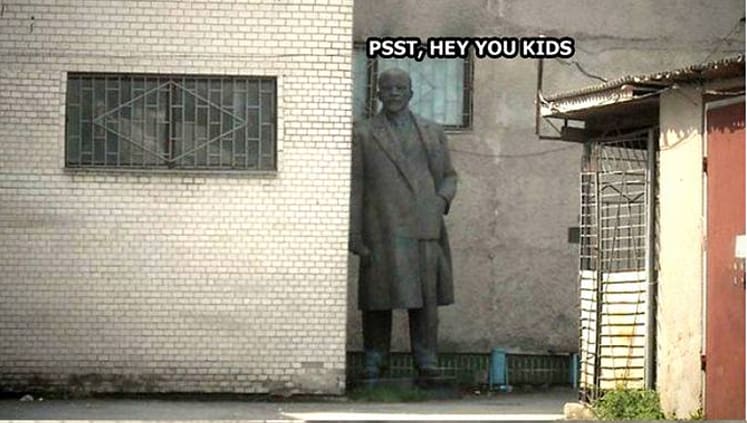AntiNote: The following is an extended excerpt of a radio interview, edited for readability.
In printing it, we are once again responding to explicit requests to do so. We find it noteworthy that This is Hell! interviews about which there is the most vocal enthusiasm are typically the ones that examine the nature of neoliberalism, its often unperceived effects on our daily lives and ways of seeing, and our tendency to misunderstand its origins and aims even as we rail against it. As Henry A. Giroux pointed out in just such an interview this past spring, this points to a very real thirst for more thorough analyses and a deeper understanding of the smilingly savage world order in which we find ourselves—a thirst which commercial media, generally speaking, refuses to quench on the grounds that it does not exist. Classic neoliberal denialism…
This interview, which host Chuck Mertz conducted with author and historian of economic philosophy Philip Mirowski on 31 May 2014, stirred up a good deal of discussion within our writers collective as well, touching as it does on so many topics of great concern to us. To name just a few: current deficiencies and disputes on the “Left;” the structure of philosophical revolutions (of which the rise of neoliberalism is one); the difficulties with using timeworn political descriptors in new contexts where they no longer apply; and the annihilation of the concept of a core moral self, which neoliberalism and fascism have in common…
Resisting the temptation to lengthily interpret Mirowski’s rejoinders (there will be plenty of time for that), we simply leave you with a link to further reading on the Mont Pelerin Society and the contentious origins of the “neoliberal thought collective” Mirowski describes:
Neoliberalism: the Revolution in Reverse by Chris Lehmann for The Baffler
Now, without further ado.
Chuck Mertz: On the line with us right now is author Philip Mirowski. Good morning, Philip.
Philip Mirowski: Good morning.
CM: Philip is the author of Never Let a Serious Crisis Go to Waste: How Neoliberalism Survived the Financial Meltdown. You start by writing, “conjure, if you will, a primal sequence encountered in B-grade horror films, where the celluloid protagonist suffers a terrifying encounter with doom, yet on the cusp of disaster abruptly awakes to a different world—which initially seems normal, but eventually is revealed to be a second nightmare more ghastly than the first. Something like that has become manifest in real life since the onset of the crisis which started in 2007.”
So what brought us here? And how much worse can neoliberalism get?
PM: A lot worse. But first I think that people need to better understand it—and also what has happened to the Left, especially in the crisis.
This was the most important economic event in my lifetime, this crisis, and I thought that I should write about its intellectual history. But as time went on, I was really appalled at how both the orthodox economics profession and neoliberal theorists seemed to be coming through unscathed, and actually better off than they were before. That’s really the purpose of the book, to try to understand that.
One of the main issues is the way people talk about neoliberalism; they don’t understand it very well. Neoliberals, first, are not conservatives. They are not libertarians. And they don’t believe in laissez-faire. I can’t believe the amount of confusion that there is in the media—and among reasonably intelligent political people, too. They don’t understand this.
Neoliberals believe in a strong state. They need a strong state to impose the kind of market society that they think should exist. And their key doctrine—this is the part that I think is hardest to understand—is that the market mainly exists as an information processor more powerful than any human being. They mean it knows more than any human being ever could; they structure their politics around that.
That’s the first interesting thing about it. It’s really about knowledge. It’s not just about the economy in some narrow sense; it’s not just about power. It’s also about what we can know and can’t know.
And interestingly enough, because of that it’s also a philosophy of what it means to be a successful human being. All kinds of people, I think, don’t care about politics; they don’t want to read these people, the neoliberals, they don’t want to know about them. But neoliberalism has percolated down to the level of everyday life for many people, and that’s the beginning of one of the arguments of why neoliberals win.
CM: How does neoliberalism change us? How does it make us redefine ourselves as citizens in ways that people may not realize? I think a lot people don’t realize that the way they view the world is being guided by neoliberalism, whether they know what it is or not.
PM: Everyday neoliberalism begins with the idea that you are the entrepreneur of yourself. The neoliberals believe all of us are flawed thinkers; we must learn to transform ourselves, to expect these packets of truth that are delivered by the market, and adjust to them. We have to learn how to accede to the fact that the market knows more than we know.
In order for that to be true, there is no true unique self that I must remain faithful to. Neoliberalism is not just a political philosophy, it’s also a philosophy of the self, and this is the part that percolates down to everyday life. Basically, since there’s no unique self, everything about me or my self can be outsourced or invested in. I have no class identity; everything is fair game to be erased, changed, and altered.
And by the way, that includes education. Education is not about finding ourselves, it’s not about becoming a solid citizen; it’s about investing in human capital for future payoff. One of the main figures of the neoclassical thought collective is Gary Becker, who invented a lot of this ‘human capital’ talk. And when it comes to failure, all failures are personal failures due to making bad choices or not undertaking risk.
What this is all about is that we must learn to undertake risk in the marketplace, to make ourselves the kind of person that the market wants us to be. Here’s a good example of this: Ilana Gershon has a wonderful set of articles about how Facebook is like training wheels for neoliberalism. It teaches you how to be a neoliberal agent. It takes your information for free, and it sells it to others for a profit. If some of your revelations are embarrassing or wrong, or maybe you want to erase them, it is up to you to fix it. Facebook has no responsibility for any of the falsehoods or problems that it creates by transmitting this stuff.
What we’re taught to do is construct a profile on Facebook from stereotypic material and measure our worth by attracting fake friends with artificial metrics. It’s a training-wheel market. Subtle algorithms force me to continually update my profile, teaching me that there’s no stable, coherent self that I must return to; indeed I can pretend to be anything I want to be on Facebook.
This shows you that people can adopt a neoliberal worldview—think about how many people are on Facebook—without even knowing or caring about politics or the theory behind it. That’s not the only part of neoliberalism that makes it strong, but it’s an important part.
CM: So a return on investment is everything when you are living in a neoliberal world. But on the other hand, we’ve heard of people choosing their spouses, for example, based on finances already in the past. How new is this neoliberal way of viewing ourselves? Is it something new or is it something that we’ve always somewhat practiced, and now it’s just on steroids?
PM: That’s an interesting question because it equates the rise of neoliberalism with the idea if marketization in our personal lives. But what’s new about neoliberalism is that there’s no core self that you have to be true to. There’s no necessarily moral self; there’s no fixed self that we somehow undermine by having market relations.
Yes, there have always been market relations in personal life. But in neoliberal theory there’s nothing more to be found other than that. That’s what’s new. People can still believe the Michael Sandel stuff, that there’s a moral limit to where the market is. But the trouble is, people can’t agree anymore where that limit is, or why it should apply to them. That’s the neoliberal insight.
“What the Left doesn’t understand is that this is part of a much larger project to occupy the entire space of understanding. Under neoliberalism, the market is an epistemic and philosophical proposition. It’s a way of thinking of the world, it’s a way of understanding yourself.”
CM: How much of the problem is simple language? Dean Baker said on our show eight, nine years ago: don’t say ‘deregulation.’ Neoliberals aren’t about deregulating, they’re about re-regulating. What happens when the critics of neoliberalism fall into this trap of saying, for example, that neoliberalism is about deregulation?
PM: What happens is they get snookered by the neoliberals. One of the great weaknesses of the Left is that the neoliberals have a far more elaborate political program which can co-opt people on the Left in a way that the Left doesn’t have at all.
I argue that the neoliberals have shown in the crisis—and with regard to climate change—that they have a full-spectrum politics, and it isn’t about deregulation at all; it’s much more elaborate than that. They have separate policies that they put into play for the short term, for the medium term, and for the long term. Let me say what they are and then give you examples of them.
In the short term, they create a fog of doubt. The short term, for them, is denialism. It happened in the economic crisis; initially what they said is, no, no, don’t do anything, it’ll just fix itself. That’s a kind of denialism. And we’re all familiar with global warming denialism. What I think people on the Left don’t understand is that the neoliberals don’t actually think they’re going to change the science or the economics. They’re not stupid. Short term denialism is a way of buying time for their other policies, for the medium term and long term policies.
Their medium term policy is not to deregulate, but rather for any problem that markets throw up to institute more (and, from their point of view, better) markets that supposedly address the problem. The way this showed up in the financial crisis was market-based bank rescue, market-based financial innovation. Their argument would be—as a matter of fact this is Robert Shiller’s line—if we just had more markets and financial instruments, that would have fixed the problem in the first place. That’s the medium term fix.
With global warming, the medium term fix is trading carbon permits. Which, by the way, the New York Times had a huge big wet kiss for yesterday. That is a neoliberal project, too.
But what’s interesting is that even in the medium term, they don’t believe that will necessarily fix all of these problems either. That’s why they’re so much smarter than the Left. The reason they like these medium-term things is they can co-opt the Left to support them. People on the Left feel that they have to support trading carbon permits because ‘that’s the only thing that could get passed in the Congress.’ So the Left gets sucked into these neoliberal projects. Or think about Obamacare: it’s the same thing.
And then they have the long term, and this is why they win. Their long term politics is a politics of utopia. It’s a politics of everything being wonderful. And the way this is going to happen is that entrepreneurs will develop outside-the-box wild ideas which the market will then decide are the right solutions to the grand problems of humanity.
The solutions in the case of global warming are geo-engineering: things like space mirrors, or pumping sulfur dioxide up into the troposphere to block out the sun, and so forth. The important point to make here is that this will be done not by governments but by entrepreneurs.
And the same thing goes for the global financial crisis. In the crisis there was this idea that if we just let entrepreneurs invent even new and better ways to both financialize the economy and to deal with various kinds of debt and so forth, what will happen is that we will, in the long term, get out of the crisis.
What’s interesting is that each of these three kinds of policies can usually be found coming out of different parts of the neoliberal thought collective. And that’s why I use the terminology ‘thought collective.’ No one person advocates all three of these all together. They tend to come out of think tanks. For example, for global warming you can get a denialist argument coming out of one part of a think tank, and a carbon permit trading argument coming out of another part of the same think tank. And those would seem to be contradictory. But what the Left doesn’t understand is that this is part of a much larger project to occupy the entire space of understanding.
So it isn’t about deregulation at all. It’s about how to set the terms of debate.
“The Left has no equivalent to the neoliberal thought collective. The thought collective is large and elaborate, because their own theory tells them that they have to organize in order to reconfigure how people think about the economy in their own lives.”
CM: Do people understand that neoliberalism is about philosophy, about politics, and it’s not about some set of economic rules that were set in stone by Adam Smith 250 years ago?
PM: The Left is pretty clueless about this. What Adam Smith and all those people 250 years ago were about was classical liberalism. That’s a kind of liberalism that believes the market just naturally develops and has to be kept in its proper sphere, and there’s a role for this ‘night watchman state’ that would stand outside and make sure it kind of worked. I know that’s a little crude, but that’s kind of what classical liberalism sounds like. John Stuart Mill is my favorite example, there.
Neoliberalism is ‘neo’ because it doesn’t buy any of that. There are no limits, in a sense, to the market. The market is an epistemic and philosophical proposition. It’s a way of thinking of the world, it’s a way of understanding yourself, and moreover they don’t believe in this ‘night watchman state.’ They believe they have to take over a strong state to institute these markets in places where they might either not exist or institute new markets whenever markets seem to fail or break down—to teach people that’s how you fix economic problems. And you can’t do that without having a strong state. So they aren’t anything like classical liberals.
CM: Why can’t we just simply regulate our way out of the neoliberal problems we have today? I’ve been told Dodd-Frank is going to fix the situation. I’ve been told we’ll bring back Glass-Steagall and that’ll fix the situation. I’ve been told all we have to do is take those things, maybe modernize them a little bit for today’s economy, and plug them in here. Does that reinforce neoliberal thinking?
PM: This is simply evidence that the Left has no equivalent to the neoliberal thought collective. I know they’ve got a couple of think tanks and all that, but the thought collective is much larger and more elaborate than that, precisely because their own theory tells them that they have to organize in order to reconfigure how people think about the economy in their own lives.
This has been going on since the founding of the Mont Pelerin Society—which I think of as one of the central nodes of the neoliberal thought collective—in 1947. So this has been going on for sixty, seventy years now, and it’s fairly elaborate and also well-entrenched in governance structures. That is part of its self-conception: that we need a strong state, and we need this intellectual infrastructure to achieve it.
So any attempt to tinker at the edges—which is the way I think of Dodd-Frank, for example—is immediately met by a mobilization of participants in the neoliberal thought collective to alter that tinkering in directions already well-understood by them. Picture this bricoleur without any history who just tinkers with stuff, as opposed to an organized political activity that’s gotten deeper.
But in another way, the Left’s understanding of the market is woefully behind the times. There is this neoclassical sense that if there’s some kind of market failure, if there’s some market that’s not working right, if we just put in a few more rules maybe it’ll work right. I think that commitment on the part of people on the Left, if that’s their understanding of markets, is totally ineffectual. That’s not the dominant view of markets that’s being promulgated in a culture which is largely neoliberal.
If you asked me, where would serious resistance come from? It would come from hitting at the heart of the neoliberal doctrine. Not this kind of tinkering around the edges. What’s the heart of the doctrine? The very image of the market as being epistemic. It’s really about knowledge; it’s about knowledge communication, it’s about knowledge generation. The Left would have to have a counter-story of what markets are and how they operate in order to have even the beginnings of the kind of political project that they could support in some kind of serious and sustained way.
CM: But is that out of fear?
PM: No, it’s out of lack of understanding; they still think that this is all about ‘Market=Good, Government=Bad.’ It’s just a waste of time. That in itself is part of the fog that neoliberals love to keep going.
CM: And it’s not just an American thing of not wanting to question capitalism?
PM: No, not at all, and that’s something really important that I try to stress: that when Mont Pelerin starts, it’s not all American. As a matter of fact it’s a mixture of a bunch of different traditions; its first meeting was in Switzerland. I don’t think Mont Pelerin is the center of neoliberalism anymore, necessarily, but it’s a very international organization—still, by the way, capped at 500 members—and it has representative members throughout the world. It’s always been a transnational thought collective. It’s always looked at things not nationally and not within specific cultures, but as a transnational project. And see, there’s nothing like that on the Left.
CM: Do you think that any of this lack of criticism, the lack of pointing out that neoliberalism is an untenable, unsustainable position—do you think the lack of critique has anything to do with a fear of being labeled socialist?
PM: I think even socialism itself is one of these older notions of how politics is arrayed which the neoliberals have managed to do an end-run around. What does it mean to be ‘socialist’ now, when the main neoliberal project is to take over the state to create the kind of markets that they believe should exist? You see? Is running the state ‘for the benefit of society’ some kind of different political project? No, what the neoliberals have done is they’ve confused what it means to be a socialist. And that’s why they’re so effective.
Let me put it another way. Socialism as a concept dates from the early 19th century. There grew up this idea that there are these two different spheres: a market sphere, and society. And society was somehow set against the market sphere. Now, I don’t know, maybe in the 19th century that was a good description of the way things were developing. But I don’t think any of those concepts hold water anymore.
“Neoliberals don’t feel threatened by the fact that stuff just keeps getting worse, as long as they can convince people to keep doing the same things—more markets to fix markets.”
CM: So you would like the Left to question a lot of the assumptions they make about the way neoliberalism works, the way we are agents within our society; you would like them to question those assumptions and in order to question assumptions you often have to undo myths…
PM: Let me just say one more thing that will probably get me in trouble. Why does the Left, which supposedly believes in the efficacy of planning, seem to act as though spontaneous self-organization of politics and spontaneous intellectual debate from below constitutes the gold standard of social epistemology? Why is that? See? It’s the Left that’s self-contradictory in many ways, that hasn’t thought through a lot of its own positions.
CM: You write that “three years on, it looks as though the neoliberals have come through the crisis unscathed. Far from the economic crisis constituting the invigorating jolt of the 1930s redux for the neoliberal thought collective, early returns seem instead to have ratified their intransigence, repetitiveness, and lack of imagination. Now it confirms that they were right to stick to their guns, because—contrary to every expectation—nothing much has been changed by the crisis. But the neoliberals have not won by default. That would be a sorry interpretation of events. Neoliberals don’t let a serious crisis go to waste; instead the thought collective subsequently made a number of moves that cemented their triumph.”
Did they make this calculation pre-crisis? Or is this something that organically just happened?
PM: It would be a mistake to perceive them as having such foresight that they are all-powerful. It doesn’t work like that. When the crisis first hit, they felt a little bit threatened, too. I actually write about that in the book, that they have this meeting in New York where they are a bit discombobulated. That’s what you would expect.
But what’s interesting is that they’re organized enough that they regroup, and they realize that their position dictates that when there is a crisis, you have the ability to define the exception. By the way, this is associated with a German political thinker known as Carl Schmitt [a member of the Nazi Party and a highly appointed jurist of the Third Reich… -ed]. In defining the exception, you can much more easily bring your policies into play during a crisis than you can during years of normal politics.
Now, Naomi Klein in her Shock Doctine has a little bit of a sense of this, but I don’t think she understands the intellectual side of it very well: that they realize that their advantage in organization is that they’re in place when these crises hit, so that they can take advantage of the exception to the rule.
Let me give you just one example of what I mean by the exception. During the crisis, it was a question what would happen to these large banks. Would, for example, the Federal Reserve actually follow the law? And what the Federal Reserve decided was, no, it’s a crisis, we don’t need to follow the law, so we can save the big banks, we can save AIG and so forth, even though technically it’s against the law. That’s what neoliberals understand that the Left doesn’t understand.
CM: You write, “nothing substantial has been altered in the infrastructure of the global financial system from its state before the crisis. Government reforms have proven superficial at best in both Europe and the United States.”
This week there were a couple of hellish news stories: IMF chief says banks haven’t changed since financial crisis, and Bank of England governor: capitalism doomed if ethics vanish. So: you’re saying it, the Bank of England is saying it, the IMF is saying it. Is Wall Street trumping everyone? Is the U.S. still in charge, driving the Titanic, and for some reason we’re not budging?
PM: I think this is due to the fact that the original neoliberal precept—this is in Milton Friedman’s story of the Great Depression—is that the way to save the system is not to let any of the largest financial units fail. And I think many of the people who had neoliberal backgrounds in many of the central banks felt that way too, in the crisis.
But of course then basically you’re just going to reinforce all of the bad tendencies that were already present. You’re going to make the financial sector more concentrated. You’re going to make it so that they do even crazier financial things because they feel like they’re always going to be saved.
So obviously this didn’t really fix anything. But that’s why, in a sense, we have to understand neoliberalism: they don’t feel threatened by the fact that stuff just keeps getting worse, as long as they can convince people to keep doing the same things—more markets to fix markets—to deal with the fact that it’s obviously getting more unstable.
CM: Did we choose neoliberalism, or were we tricked into it?
PM: No one’s tricked into stuff. It’s an intellectual movement. It takes time, they need recruits, they need funding, they need organization. Partly what I do as a historian is I document those kind of organizational moves. And for these various movements to become well-placed, they have to define what is the problem, and what to do about it, and so forth.
Here’s another problem on the Left, and then I’ll stop saying that because it gets boring. Another problem on the Left is they think, well, either stuff just happens spontaneously or it’s a conspiracy theory. They don’t believe in the in-between, which is where most of the world is. There are these really deep-rooted historical projects that keep going and there are people who are intellectuals and talk to each other and argue things out, and there are people who have political arms, who exist to do things and put into play these various ideas that have been argued out.
Here’s just one example. Think of Jim DeMint. Jim DeMint was a senator. He gave up his seat in the U.S. Senate so that he could become head of the Heritage Foundation and Heritage Action. Heritage Action is one of these existing structures that exist to take neoliberal ideas and make sure they get pumped into the Republican Party and into the discourse generally in society, so that people will think that neoliberal ideas are solutions to neoliberal problems. Jim DeMint sees that it’s better to be head of that than it is to be in the Senate.
That’s not conspiracy.
CM: One last question for you, Philip, and it is our Question from Hell: the question we hate to ask, you might hate to answer, or our audience is going to hate the response.
What does it say about neoliberalism, what does it say about the Right, what does it say about the Left, what does it say about the Culture War—which I guess is where all this comes together—when the Left is focusing on gay marriage, gun control, and legalizing marijuana while neoliberalism seeps into every aspect of our society, even leading people (as you point out) like Ezra Klein to make many neoliberal assumptions while ostensibly fighting neoliberalism?
PM: Well, as a historian, let me answer historically. I think back to the 1930s and 1940s, when the world had come crashing down and everyone had become hostile to what they then perceived as laissez-faire philosophy, and they were on the outs. They didn’t decide that they should pursue these piecemeal little political objectives or those political disputes. They decided that they had to rethink the entire project.
That’s the way to understand Mont Pelerin and the rise of these think tanks and so forth. It is fascinating: many of them wrote essays that say “why I’m not a conservative.” They felt that conservatism itself would have to be rethought from the ground up. I think that very few people today on the Left have that kind of patience or imagination.
Transcribed and printed with permission. Listen to the full interview right here!
Featured Image: TV/Radio tower atop the actual Mont Pèlerin in Switzerland. Source: Widmer Wandert Weiter, a hiking blog kept by Swiss journalist Thomas Widmer





